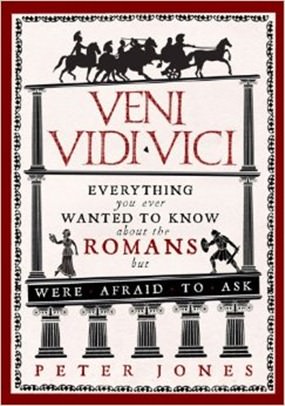Veni, Vidi, Vici is a Latin phrase that is known by most people, so it is understandable that author Peter Jones would use it for the title his latest book (ISBN 978-1-78239-390-0, Atlantic Books, 2014). Jones actually expands the title to be, “Everything you ever wanted to know about the Romans but were too afraid to ask.”
A more detailed explanation of Veni, Vidi, Vici (I came, I saw, I conquered) reportedly originates from a letter that Julius Caesar wrote to the Roman Senate around 46 BC, in the city of Zela (now in Tokat Province, Turkey, and known as Zile), after achieving victory in his short war against Pharnaces II of Pontus at the Battle of Zela.

Author Jones is far from the stuffy professor, immersed in his subject, and totally without a humorous bone in his body. On the first page of the introduction he writes of graffiti on a wall in Pompeii which runs, “I came here, had a shag, then went home.” The last of the romantics muses Jones.
The format of this book is also different from the usual historical tomes, where each chapter has a broad overview of the years being covered and then followed up by what Jones calls ‘nuggets’ which are short explanations or expansions on some of the subjects. This definitely makes for easy reading, stops any laboring of the main theme and has the reader looking forward to the next ‘nuggets’.
Peter Jones has studied all the historical reports that are known about the Romans in times long past, and is not afraid to say that much of the stories are made up. That includes Romulus and Remus and the she-wolf that raised them. Damn! I liked that story. Carthage, however, was indeed sacked, but it was not sown with salt. That is another make up says author Jones. In fact, Caesar rebuilt Carthage 100 years later.
There is much that we have to thank the Romans for, and one lasting feature is pozzuolana cement, a very much harder and durable mix and one that can even set under water. The development of this Roman finding is still used today.
In 133 BC it was found that with the army overseas fighting wars, the rich were taking advantage of this and appropriating land illegally. This required laws to be pushed through the senate to counter this. Seems that the Thai situation today is very similar.
Continuing to compare business today in Thailand and in Cicero’s time in Rome, Peter Jones states, “Governors needed a lot of cash as they had to make three fortunes (1) To recoup election expenses, (2) To bribe the jury on charges of provincial mismanagement and (3) to live off.”
The eruption of Vesuvius in AD 79 is given in great detail, with the initial explosion 500 times greater than the bomb that destroyed Hiroshima.
At B. 545 at Bookazine, this is a superb book for anyone with even the slightest interest in the Romans and their influences upon us still today. Good resource material for students in their last two years at school.




